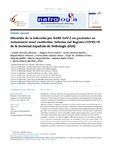Mostrar o rexistro simple do ítem
Situación de la infección por SARS-CoV-2 en pacientes en tratamiento renal sustitutivo. Informe del Registro COVID-19 de la Sociedad Española de Nefrología (SEN)
| dc.contributor.author | Sánchez-Álvarez, J. Emilio | |
| dc.contributor.author | Pérez-Fontán, Miguel | |
| dc.contributor.author | Jiménez Martín, Carlos | |
| dc.contributor.author | Blasco Pelícano, Miquel | |
| dc.contributor.author | Cabezas Reina, Carlos Jesús | |
| dc.contributor.author | Sevillano Prieto, Ángel M. | |
| dc.contributor.author | Melilli, Edoardo | |
| dc.contributor.author | Crespo Barrios, Marta | |
| dc.contributor.author | Macía Heras, Manuel | |
| dc.contributor.author | Pino y Pino, María Dolores del | |
| dc.date.accessioned | 2021-10-28T09:17:53Z | |
| dc.date.available | 2021-10-28T09:17:53Z | |
| dc.date.issued | 2020-04-16 | |
| dc.identifier.citation | Sánchez-Álvarez JE, Pérez Fontán M, Jiménez Martín C, Blasco Pelícano M, Cabezas Reina CJ, Sevillano Prieto AM, et al. Situación de la infección por SARS-CoV-2 en pacientes en tratamiento renal sustitutivo. Informe del Registro COVID-19 de la Sociedad Española de Nefrología (SEN). Nefrología. 2020;40(3):272-278 | es_ES |
| dc.identifier.issn | 0211-6995 | |
| dc.identifier.uri | http://hdl.handle.net/2183/28748 | |
| dc.description.abstract | [Resumen] Introducción. La reciente aparición de la pandemia por el coronavirus SARS-CoV-2 ha impactado de forma muy importante en la población general. Los pacientes en tratamiento renal sustitutivo (TRS) no han sido ajenos a esta situación y por sus características resultan especialmente vulnerables. Presentamos los resultados del análisis del Registro COVID-19 de la Sociedad Española de Nefrología. Material y métodos. EL Registro comenzó a funcionar el 18 de marzo de 2020. Recoge variables epidemiológicas, datos del contagio y diagnóstico, clínica acompañante, tratamientos y desenlace. Se trata de un registro on line. Los pacientes fueron diagnosticados de infección por SARS-CoV-2 en base a los resultados de la PCR del virus, realizada tanto en pacientes que habían manifestado clínica compatible o tenían signos sospechosos como en aquellos a los que se había hecho como cribado tras algún contacto conocido con otro enfermo. Resultados. A fecha 11 de abril el Registro disponía de datos de 868 pacientes, procedentes de todas las comunidades autónomas. La modalidad de TRS más representada es la hemodiálisis en centro (HDC) seguida de los pacientes trasplantados. La clínica de presentación es similar a la población general. Un porcentaje muy elevado (85%) requirió ingreso hospitalario, un 8% en unidades de cuidados intensivos. Los tratamientos más utilizados fueron hidroxicloroquina, lopinavir-ritonavir y esteroides. La mortalidad es elevada y alcanza el 23%: los pacientes fallecidos estaban con más frecuencia en HDC, desarrollaban más frecuentemente neumonía y recibían en menos ocasiones lopinavir-ritonavir y esteroides. La edad y la neumonía se asociaban de forma independiente al riesgo de fallecer. Conclusiones. La infección por SARS-CoV-2 afecta ya a un número importante de pacientes españoles en TRS, fundamentalmente aquellos que están en HDC, las tasas de hospitalización son muy elevadas y la mortalidad es elevada; la edad y el desarrollo de neumonía son factores asociados a mortalidad. | es_ES |
| dc.description.abstract | [Abstract] Introduction. The recent appearance of the SARS-CoV-2 coronavirus pandemic has had a significant impact on the general population. Patients on renal replacement therapy (RRT) have not been unaware of this situation and due to their characteristics they are especially vulnerable. We present the results of the analysis of the COVID-19 Registry of the Spanish Society of Nephrology. Material and methods. The Registry began operating on March 18th, 2020. It collects epidemiological variables, contagion and diagnosis data, signs and symptoms, treatments and outcomes. It is an online registry. Patients were diagnosed with SARS-CoV-2 infection based on the results of the PCR of the virus, carried out both in patients who had manifested compatible symptoms or had suspicious signs, as well as in those who had undergone screening after some contact acquainted with another patient. Results. As of April 11, the Registry had data on 868 patients, from all the Autonomous Communities. The most represented form of RRT is in-center hemodialysis (ICH) followed by transplant patients. Symptoms are similar to the general population. A very high percentage (85%) required hospital admission, 8% in intensive care units. The most used treatments were hydroxychloroquine, lopinavir-ritonavir, and steroids. Mortality is high and reaches 23%; deceased patients were more frequently on ICH, developed pneumonia more frequently, and received less frequently lopinavir-ritonavir and steroids. Age and pneumonia were independently associated with the risk of death. Conclusions. SARS-CoV-2 infection already affects a significant number of Spanish patients on RRT, mainly those on ICH, hospitalization rates are very high and mortality is high; age and the development of pneumonia are factors associated with mortality. | es_ES |
| dc.language.iso | spa | es_ES |
| dc.publisher | Elsevier | es_ES |
| dc.relation.uri | https://doi.org/10.1016/j.nefro.2020.04.002 | es_ES |
| dc.rights | Creative Commons Attribution-NonCommercial-NoDerivs 4.0 International License (CC-BY-NC-ND 4.0) | es_ES |
| dc.rights.uri | http://creativecommons.org/licenses/by-nc-nd/4.0/ | * |
| dc.subject | SARS-CoV-2 | es_ES |
| dc.subject | Registro | es_ES |
| dc.subject | Tratamiento renal sustitutivo | es_ES |
| dc.subject | España | es_ES |
| dc.subject | Sociedad Española de Nefrología | es_ES |
| dc.subject | Registry | es_ES |
| dc.subject | Spain | es_ES |
| dc.subject | Renal replacement therapies | es_ES |
| dc.subject | Spanish Society of Nephrology | es_ES |
| dc.title | Situación de la infección por SARS-CoV-2 en pacientes en tratamiento renal sustitutivo. Informe del Registro COVID-19 de la Sociedad Española de Nefrología (SEN) | es_ES |
| dc.title.alternative | SARS-CoV-2 infection in patients on renal replacement therapy. Report of the COVID-19 Registry of the Spanish Society of Nephrology (SEN) | es_ES |
| dc.type | info:eu-repo/semantics/article | es_ES |
| dc.rights.access | info:eu-repo/semantics/openAccess | es_ES |
| UDC.journalTitle | Nefrología | es_ES |
| UDC.volume | 40 | es_ES |
| UDC.issue | 3 | es_ES |
| UDC.startPage | 272 | es_ES |
| UDC.endPage | 278 | es_ES |






